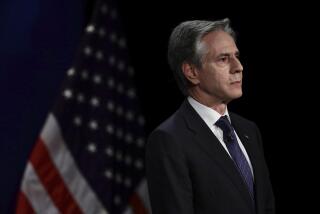Calls to Freeze Russian Aid Toned Down : Espionage: Leaders in Congress temper outrage over Kremlin spying. But they still plan to reassess donations. Partnership policy faces scrutiny.
WASHINGTON â Leading members of Congress on Sunday scaled back their demands for a freeze on aid to Russia but said they still want to reassess the $2.5-billion program in the wake of the espionage scandal that erupted last week.
Senate Intelligence Committee Chairman Dennis DeConcini (D-Ariz.), who called for an aid freeze after a veteran CIA officer was arrested on charges of spying for the Kremlin, said he now merely wants a new look at the issue.
âThereâs no question nations are going to spy on each other,â DeConcini said on NBC-TVâs âMeet the Press.â âWeâre going to continue to do it, and Israel may still be doing it with the United States . . . and we are a big donor to Israel.
âIâm not saying stop aid,â he added. âReassess our aid and look . . . (at) what aid is really in our best interest.â
Members of Congress reacted with outrage after federal authorities arrested CIA official Aldrich H. Ames and charged him with spying for the former Soviet Union and then Russia for as long as 10 years.
Many demanded that Russia be punished for spying on the U.S. government at a time when the United States is sending aid to help reform Russiaâs economy.
Some, like DeConcini, suggested that the U.S. aid program, which President Clinton has cited as one of his major foreign policy accomplishments, be suspended entirely.
Clinton reacted on two fronts: ordering the expulsion of the man U.S. officials say is the chief intelligence officer at the Russian Embassy in Washington, but also defending the Administrationâs aid program as founded on âclear American interests.â
At the same time, sources said, CIA officials privately told members of Congress that they did not consider Russian espionage activities in the United States a violation of the law of the jungle that still prevails in the world of intelligence.
Statements by DeConcini and other senators over the weekend indicated that the Administrationâs arguments were making some headway. But they also suggested that Clintonâs policy of large-scale aid programs aiming at âpartnershipâ with Russia is in for tougher scrutiny than ever before.
Congress has already approved $2.5 billion in aid for Russia and other republics of the former Soviet Union this year, and the Administration has requested an initial commitment of $900 million for next year.
âThis use of aid to Russia really has to be broken down as to what thatâs all about,â Sen. Richard G. Lugar (R-Ind.), another member of the Intelligence Committee, said on the NBC program. âWe have to get over the idea, I think, that this is a partnership. This is a tough rivalry, and that is an important distinction to make. These are tough people with whom to deal. And weâre not going to be involved in handouts.â
Sen. Mitch McConnell (R-Ky.), the senior Republican on the Appropriations subcommittee that oversees foreign aid, said he wants to âtake a good, hard lookâ at U.S. assistance to Russia--not because of espionage but because of Russiaâs increasingly independent foreign policy in Bosnia, the former republics of the Soviet Union and elsewhere.
âMaybe that money would be better spent in some of these countries under Russian dominance,â he said on ABC-TVâs âThis Week With David Brinkley.â
âWhat weâre seeing here--and itâs perfectly apparent to everyone except the Clinton Administration State Department--is that they intend to be rivals,â he said.
DeConcini said the spy case had revealed a serious problem in security at the CIA, âand that really is more of a problem in my judgment than the relation with Russia. We have to deal with our own house first.â
He said the CIA and the FBI had investigated the possibility that a Russian mole was inside U.S. intelligence beginning in 1985, but they did not fully join forces until 1991.
As a first step, he said, his committee will recommend a change in regulations that would allow the CIA access to credit reports and other financial records of CIA officers in sensitive positions, a proposal the panel considered but did not act on in 1991.
Federal authorities charge that during his later years as a Russian spy, Ames paid $540,000 cash for a house outside Washington, bought a Jaguar automobile and spent hundreds of thousands of dollars on credit card bills--but the CIA had no easy way to check whether he was receiving outside income.
More to Read
Sign up for Essential California
The most important California stories and recommendations in your inbox every morning.
You may occasionally receive promotional content from the Los Angeles Times.











